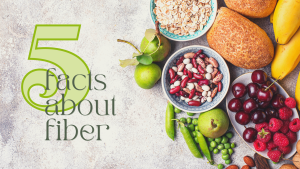
Everyone talks about how to get more fiber in the diet, but not all types of fiber are for everyone. We review a few facts about this valuable nutrient so you can see which is best for you.
1. There are actually two types of fiber.
Yep, there’s SOLUBLE fiber and INSOLUBLE fiber. Let’s break down the difference. Solubility has to do with a substance’s ability to dissolve in water. That means SOLUBLE fiber is able to dissolve better. Certain types of SOLUBLE fiber (i.e. psyllium husk and beta-glucan) form a gel-like consistency in the digestive tract. Like the name suggests, INSOLUBLE fiber (i.e. bran) does not dissolve, nor is it digested.
2. Soluble and insoluble fibers work differently to promote regularity.
Now that we know about SOLUBLE fiber’s ability to form a gel-like consistency, we can make better sense of how it helps us GO more easily. It’s able to hold water in the large intestine, which then softens hard stool and firms up loose stool. INSOLUBLE fiber works differently in that it does not hold water. Instead, it physically rubs the intestinal lining, which stimulates the secretion of water and mucus into the bowels.[1] So while it doesn’t hold onto water, INSOLUBLE fiber can add water to the stool, promote bowel movement frequency, and relieve constipation through a mechanical action.
3. Soluble fiber can help lower cholesterol levels.
Psyllium husk is a great example of a high-viscosity, gel-forming SOLUBLE fiber that can help reduce cholesterol levels and reduce risk of heart disease. As it moves along the digestive tract, it traps bile, which is responsible for the digestion and absorption of lipids. You might be thinking, “wouldn’t that raise cholesterol levels?” Nope. Since it traps bile in the intestines, liver cells compensate for that by stimulating bile synthesis using low-density lipoprotein (LDL) cholesterol.[1] That’s how fiber helps to lower serum cholesterol levels!
4. Soluble fiber can help manage healthy blood sugar levels.
High-viscosity, gel-forming SOLUBLE fiber can also slow the absorption of glucose in the small intestine and thicken the mixture of food and digestive juices traveling through the gut. By lowering glycemic load and slowing absorption of carbs, fibers like psyllium husk can aid in glycemic control and decrease appetite.[1]
5. Dr. Morrison’s functional fibers have both types of fiber.
Daily Benefit Fiber contains both SOLUBLE and INSOLUBLE fiber, as well as other ingredients that help support a healthy digestive tract.* It is better suited for those experiencing issues with looser stools. Made with rice, this functional fiber is great for individuals sensitive to psyllium husk, wheat, corn, or citrus. Daily Fiber B is a more potent functional fiber to help move things along and deal with constipation. It contains an impressive blend of SOLUBLE and INSOLUBLE fibers to promote healthy bowel function.* Both formulas are ideal for supporting the detoxification process and promoting regularity.
Need a little more guidance on incorporating a proper balance of fiber suitable for your needs?
Consider speaking with one of our integrative health coaches to help you identify the underlying causes of health imbalances, and the best foods and supplements to rebalance your system. Call our office to find out more: 212-989-9828.
*These statements have not been evaluated by the FDA and are not intended to treat or cure any disease.
References
- McRorie Jr JW, McKeown NM. Understanding the physics of functional fibers in the gastrointestinal tract: An evidence-based approach to resolving enduring misconceptions about insoluble and soluble fiber. J Acad Nutr Diet. 2017;117(2):251-264. https://doi.org/10.1016/j.jand.2016.09.021